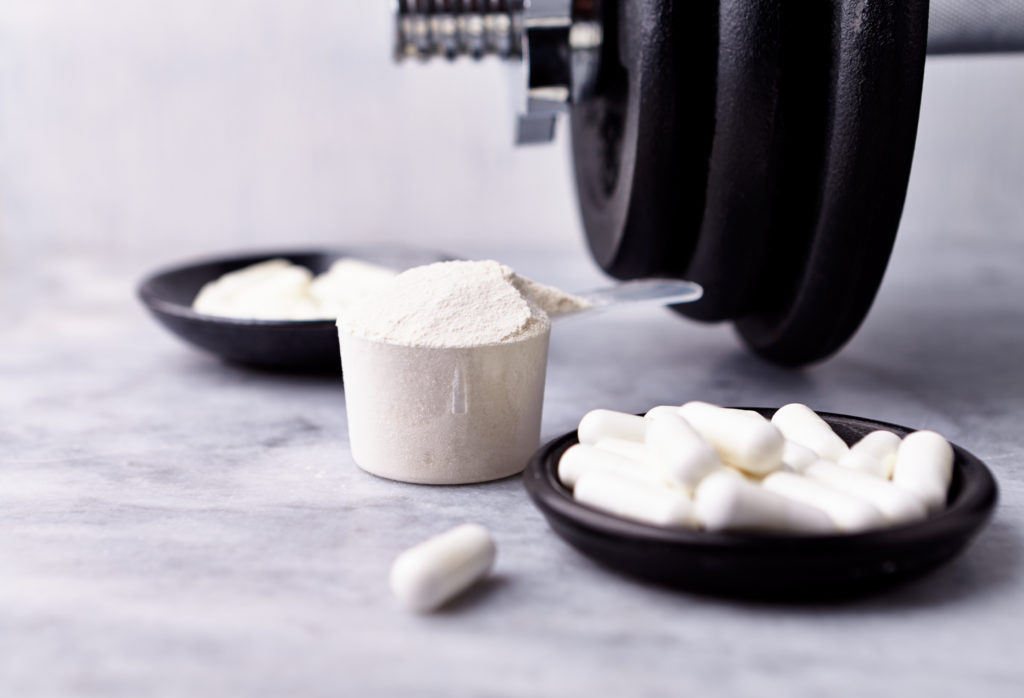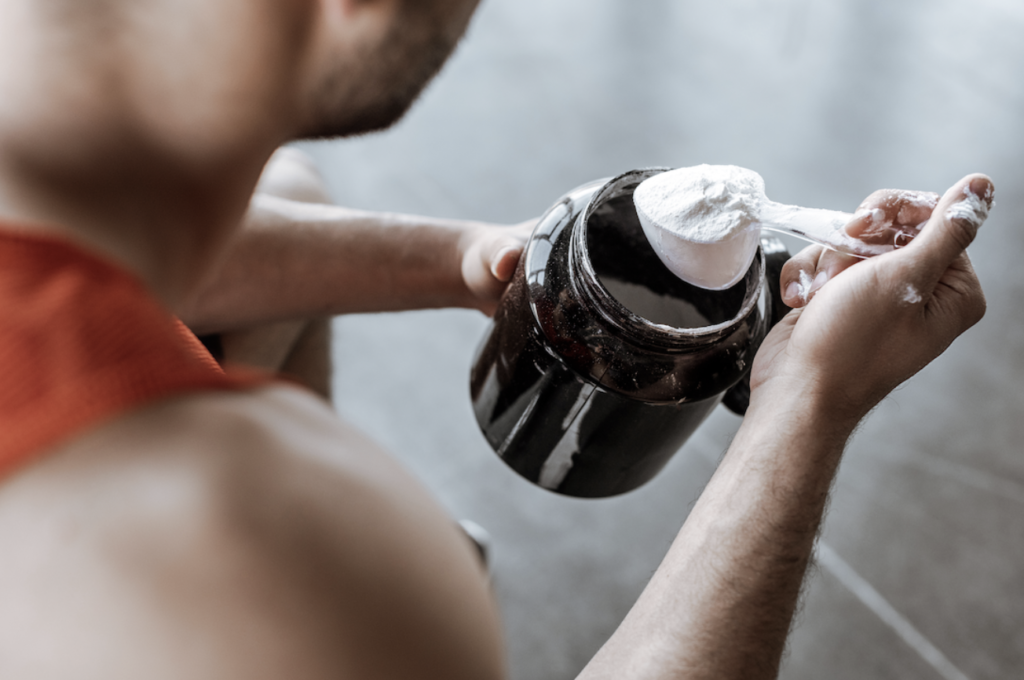

Do you want to build muscle, enhance your fitness, or improve your athletic performance?
How about getting complete nutrition from food products and avoiding toxic chemicals?
If you answered “Yes” to any of these questions, there is no better option than creatine.
Creatine is one of the most researched supplements on the market, with a long history of safety and effectiveness. Countless studies prove that creatine promotes greater muscle mass, power, fat loss, and faster recovery after intense workout sessions.
It’s safe for anyone interested in muscle building, sports performance, or general well-being.
With many types of creatine out there, it’s hard to pick the right one for you.
It comes in many forms including creatine malate, monohydrate, and Kre-Alkalyn, making it hard to know the difference among them, the best one for you, and their benefits.
Let’s take a deeper look at monohydrate and Kre-Alkalyn and how they differ.
What is Creatine?
Creatine is a substance made up of three amino acids – arginine, glycine, and methionine. It is produced naturally in the body and found in red meat and fish.
Once ingested, it is transported into the muscle cell and combines with other compounds to form phosphocreatine, a source of stored energy used during short periods of intense activity.
The phosphocreatine (Pcr) molecule is then donated to create ATP (Adenosine Triphosphate), which helps supply energy to your muscle cells quickly and efficiently while reducing recovery time between workouts.
The more creatine you have stored in your muscles, the more energy you’ll have available during exercise, which can cause an increase in strength, muscle growth, and enhanced performance during short-burst, high-intensity activities such as weightlifting or sprinting.
The Purpose of Creatine

To Supply You With Energy
The primary purpose of creatine is to supply energy for high-intensity activities such as weightlifting. It does this by acting as a rapid energy source for muscle cells, which increases the speed at which they can produce short bursts of energy known as ATP.
This enables you to go harder for longer when lifting weights or doing any other physical activity that requires a lot of effort over a short period.
Promote Muscle Growth and Endurance
Creatine promotes muscle growth, endurance, and recovery from exercise sessions. An increased rate of ATP regeneration helps support muscle function during exercise, which can help you train harder for more extended periods without experiencing fatigue.
Improves Your Exercise Performance
Creatine has been shown to improve exercise performance by increasing the amount of ATP available to the muscles. The working muscles quickly synthesize ATP from ADP with creatine phosphate as a cofactor, helping your muscles generate additional force or speed.
It also makes it possible for your muscles to contract before reaching their maximum force potential, allowing you to lift more weight for more reps or run faster for more extended periods.
Increases Muscle Mass
Your muscles are composed of approximately 70% water, so they need plenty of water to function optimally. Creatine has been proven to help muscle cells retain more water. This helps to increase muscle volume and strength by enhancing protein synthesis and stimulating muscular hypertrophy (growth).
Increases Strength
Creatine works by converting into creatine phosphate, which aids in replenishing ATP (adenosine triphosphate) molecules, which are considered the primary energy source in cells.
Boost Your Brain Functioning
Improve your brain function and reduce mental fatigue. Researchers have found that taking creatine daily for just four to 10 days can improve brain function by up to 15 percent during tests that measure reaction time, short-term memory, and impulse control.
Types of Creatine
There are many types of creatine, but we will discuss the main ones: Kre-Alkalyn and Monohydrate.
Monohydrate Creatine
Creatine Monohydrate (CrM) is the most popular and widely researched supplement ever produced. Since its introduction in 1993, thousands of people have turned to creatine as a supplement for improving muscle mass, strength, and endurance.
Studies have shown creatine monohydrate effectively increases lean muscle mass, improving overall performance. It also reduces muscle fatigue, allowing you to perform more repetitions with weight.
There is also evidence that creatine may increase body water content, aiding in fat loss.
Monohydrate is considered the purest form of creatine and offers the best results. However, it has some drawbacks. For instance:
- It is less soluble, which may make you experience gastrointestinal distress when consumed in large quantities.
- It is not as effective as other forms of creatine. The creatine loading phase involves taking 20 grams of creatine per day for five days, followed by a maintenance dose of 2-5 grams per day afterward, which is a larger dose.
- Creatine monohydrate may also need cycling, including a one-week loading phase.
Kre-Alkalyn Creatine (Buffered Creatine)
Buffered creatine is a patented form of creatine that does not convert to creatinine, making it the most potent form of creatine available. It has better bioavailability, meaning that it is pH balanced (pH between 7 -14) and fully dissolvable in water.
It reduces the chance of stomach cramps, bloating, and water retention associated with regular monohydrate creatine. Usually, these problems are caused by the conversion of creatine into creatinine.
Kre-Alkalyn tackles these effects by adjusting the pH of monohydrate creatine with alkaline powder, such as magnesium, soda ash, or bicarbonate. In this approach, Kre-Alkalyn can supply concentrated creatine levels without converting it to creatinine, which has many adverse effects.
Difference Between Monohydrate and Kre-alkalyn Creatine
Let’s differentiate the two creatine based on the side effects, solubility, absorption, creating loading, and price.
Side Effects
Kre-Alkalyn is made using an alkaline buffering process rather than traditional acidification. This prevents the formation of creatinine, which can cause stomach distress and reduce absorption during your workouts.
However, creatine monohydrate is made using traditional acidification; this causes the formation of creatinine that may result in bloating, stomach distress, and cramps.
Absorption
Kre-Alkalyn, a creatine monohydrate supplement produced in powder form, gets absorbed more quickly than creatine monohydrate, making Kre-Alkalyn ideal for you. It has been said to have a 90% absorption rate into the muscles compared to monohydrate creatine, which only has 2 to 18%.
It also means you need little Kre-Alkalyn as you do creatine monohydrate to achieve the desired effect.
Creatine Loading Phase
Kre-Alkalyn does not require a loading phase for effectiveness, whereas creatine monohydrate requires a creatine loading phase that can take up to a week with 4-5 Followed by a lower dose of creatine, ranging from 2 to 10 grams, to be administered for the body to use the product.
Price
Buffered creatine is slightly more expensive than monohydrate. Creatine monohydrate costs around 3-4 times less than creatine Kre-Alkalyn.
Solubility
Creatine monohydrate does not dissolve well in water, which causes stomach discomfort when taken in high doses. Kre-Alkalyn dissolves perfectly in the water, making it superior to creatine monohydrate supplements.
Performance
Kre-Alkalyn has shown a greater impact on power output than monohydrate, as well as a greater impact on anaerobic endurance when compared to monohydrate.
Benefits of Creatine Monohydrate and Kre-Alkalyn

The benefits include:
-
Increased muscle size
-
Increased energy levels during workouts.
-
Improve performance in high-intensity anaerobic activities, such as weight lifting or sprinting.
-
Increased skeletal muscle mass.
-
Increased endurance.
-
Boost brain functioning.
Comparison Between Monohydrate and Kre-Alkalyn Creatine
Next, let’s compare monohydrate and Kre-Alkalyn creatine in terms of powerlifting, energy level, endurance level, and maximum energy consumption during exercise.
Level of Energy, Endurance, and Stamina
A biomedical company conducted tests on 12 football players. The group was split into two different weight groups, one was given 1.5g of creatine Kre-Alkalyn, and another was given 1.5g of monohydrate creatine each for six days.
Results showed that all groups’ energy levels, endurance, stamina, and body fat percentages increased. Meaning, both Kre-alkalyn and creatine monohydrate significantly boost energy levels and stamina, which aid in the optimization of workouts.
Powerlifting Capacity
For 60 days, researchers divided 24 Olympic weightlifters into two groups and supplemented one with creatine monohydrate and Kre-alkalyn.
The researchers discovered that both Kre-Alkalyn and monohydrate increased strength.
However, monohydrate exhibited an average increase of 8.39 percent, while the Kre-Alkalyn group showed a rise of 10.76 percent.
The Volume of Maximum Energy Consumption (VO2)
For 16 weeks, 24 male soccer players were split into two groups and given either 750mg of Kre-Alkalyn or 750 mg of creatine monohydrate per day.
The results showed that the Kre-Alkalyn group had a higher VO2 max than the monohydrate group. There was, however, little difference between the two groups in terms of lean muscle mass and muscle strength.
Dieting Suggestions While on Creatine Kre-Alkalyn and Monohydrate
Monohydrate is well-tolerated, but you may experience cramping, bloating, and water retention. It’s best to avoid any drastic changes in diet, such as severe caloric restriction or carbohydrate elimination.
Kre-Alkalyn is formulated to reduce creatine monohydrate side effects. Nevertheless, consider what you’re eating when using it. Reduce your intake of foods containing sugar and refined carbohydrates if possible during the first week of your creatine program. Your body will have an easier time processing all the extra calories and carbohydrates, which can help minimize side effects such as bloating.
Take creatine with a carbohydrate source before workouts and after workouts to help increase muscle mass and restore glycogen levels into the body.
Drink plenty of water while taking the creatine supplement to avoid dehydration caused by creatine monohydrate, making you experience muscle cramps or spasms.
Bottom Line
Athletes and bodybuilders use creatine Kre-Alkalyn and monohydrate supplements to increase muscle mass, strength, and athletic performance. Unfortunately, not all creatine supplements work equally well.
Creatine monohydrate has been linked to bloating, diarrhea, nausea, and general stomach discomfort when taken.
Kre-Alkalyn is pH buffered through an amino acid base, making it more stable than creatine monohydrate, therefore, safer to use. It is proven to be just as effective as creatine monohydrate but without monohydrate’s side effects.
Besides overcoming the side effects of creatine monohydrate, Kre-Alkalyn increases VO2 Max.
So, Which Creatine Option is Better for You?
If you are trying to gain mass, then monohydrate is a better option, as it will deliver more creatine to your muscles than Kre-Alkalyn. This can lead to increased growth hormone levels in your body, leading to more muscle mass.
But if your goal is to maintain lean mass or increase endurance performance, Kre-Alkalyn is the way to go. With Kre-Alkalyn, you will get about 10% more absorption than monohydrate, but it will also have less of a negative effect on your stomach.
In addition, Kre-Alkalyn will improve your athletic performance by allowing for quick bursts of intense exercise while increasing muscle force and power, making it the best creatine option for crushing workouts and gaining fitness.






















You must be logged in to post a comment Login